democracynow.org
Stories:

Democrats Sue Trump & GOP Under 1871 KKK Act for Threatening Voters of Color
CAROL ANDERSON: Oh, and voting was just verboten. They could not vote. I mean, and this is why you have to have then the 15th Amendment coming in in about 1870, providing the right to vote, because that thing of moving from property to citizen was so abhorrent, so repulsive to white Southerners, that they went, "Absolutely not," and did everything in their power to strip African Americans of their citizenship rights. ... Read More →
The Democratic Party has filed lawsuits in four battleground states—Ohio, Arizona, Nevada and Pennsylvania—alleging Donald Trump’s campaign and the Republican Party are "conspiring to threaten, intimidate, and thereby prevent minority voters in urban neighborhoods from voting." The lawsuits cite the Voting Rights Act and the 1871 Ku Klux Klan Act. In its filing, the Ohio Democratic Party write, "Trump has sought to advance his campaign’s goal of 'voter suppression' by using the loudest microphone in the nation to implore his supporters to engage in unlawful intimidation." The suits also names Trump adviser Roger Stone and his super PAC, Stop the Steal. Trump has repeatedly urged his supporters to monitor polling booths on Election Day. The North Carolina NAACP has also filed a federal lawsuit Monday seeking an immediate injunction to stop the state and various county boards of elections from illegally canceling the registrations of thousands of voters. The NAACP says African-American voters are being targeted in a coordinated effort to suppress the black vote in the state. For more, we speak with Carol Anderson, professor of African American studies at Emory University. She is author of the new book, "White Rage: The Unspoken Truth of Our Racial Divide."
TRANSCRIPT
This is a rush transcript. Copy may not be in its final form.
AMY GOODMAN: The Democratic Party has filed lawsuits in four battleground states—Ohio, Arizona, Nevada and Pennsylvania—alleging Donald Trump’s campaign and the Republican Party are, quote, "conspiring to threaten, intimidate, and thereby prevent minority voters in urban neighborhoods from voting," unquote. The lawsuits cite the Voting Rights Act and the 1871 Ku Klux Klan Act. In its filing, the Ohio Democratic Party writes, quote, "Trump has sought to advance his campaign’s goal of 'voter suppression' by using the loudest microphone in the nation to implore his supporters to engage in unlawful intimidation," unquote. The suits also name Trump adviser Roger Stone and his super PAC Stop the Steal. Trump has repeatedly urged his supporters to monitor polling booths on Election Day.
DONALD TRUMP: You’ve got to go out. You’ve got to go out, and you’ve got to get your friends, and you’ve got to get everybody you know, and you’ve got to watch your polling booths, because I hear too many stories about Pennsylvania, certain areas. I hear too many bad stories. And we can’t lose an election because of you know what I’m talking about. So go and vote and then go check out areas, because a lot of bad things happen. And we don’t want to lose for that reason. We don’t want to lose, but we especially—we don’t want to lose for that reason. So go over and watch, and watch carefully.
AMY GOODMAN: In related news, the North Carolina NAACP filed a federal lawsuit Monday seeking an immediate injunction to stop the state and various county boards of elections from illegally canceling the registrations of thousands of voters. The NAACP says African-American voters are being targeted in a coordinated effort to suppress the black vote in North Carolina.
Meanwhile, a prominent white nationalist is sponsoring robocalls in the state of Utah to urge voters to back Trump over the third-party candidate Evan McMullin. Some polls show McMullin, who is Mormon, could beat Trump in Utah. They ads feature William Johnson, the leader of the white nationalist American Freedom Party.
WILLIAM JOHNSON: My name is William Johnson. I am a farmer and a white nationalist. I make this call against Evan McMullin and in support of Donald Trump. Evan McMullin is an open borders amnesty supporter. Evan has two mommies: His mother is a lesbian married to another woman. Evan is OK with that. Indeed, Evan supports the Supreme Court ruling legalizing gay marriage. Evan is over 40 years old and is not married and doesn’t even have a girlfriend. I believe Evan is a closet homosexual. Don’t vote for Evan McMullin. Vote for Donald Trump.
AMY GOODMAN: The election just a week away, we’re joined now by Carol Anderson, professor of African American studies at Emory University. She’s author of a new book; it’s called White Rage: The Unspoken Truth of Our Racial Divide.
Well, there’s a lot to talk about in this election—
CAROL ANDERSON: Yes, there is.
AMY GOODMAN: —Professor Anderson. Let’s begin with this suit that’s being brought by the state Democratic parties in key states, saying that the Trump organization—that the Trump campaign is violating the Klan Act. Explain.
CAROL ANDERSON: Yes, and it’s really, in a horrible way, very simple. As I laid out in White Rage, part of what happened is that when African Americans advance, when they gain access to their citizenship rights, you see a wave of policies emanate out of Congress, out of the White House, to knock back those gains, those advancements. We saw that after the Civil War with Reconstruction.
Now, move this forward. Part of what we’re seeing now is the backlash to Obama’s election. And so, we saw a wave of voter suppression laws come up. And when you look at these key battleground states and the things that they’re doing, they’re vintage. They go back to the era of Jim Crow, they go back to the era after the Civil War, when the point was: How do we intimidate these newly freed people who now have their citizenship rights? How do we strip them of their citizenship rights? One was massive voter intimidation, being at the polls with rifles. It is then a series of laws coming on, from literacy tests and grandfather clauses and poll taxes—all of those things for disfranchisement. We move to the Voting Rights Act of ’65, and then we get to Shelby County v. Holder, where this Supreme Court gutted it. And this is what we see as the result.
AMY GOODMAN: Now, I want to go back to the Civil War and after. You mentioned Reconstruction. So, slaves are freed, and what happens?
CAROL ANDERSON: What happens is, is that they don’t get free. They get—they’re immediately hit with a thing called the Black Codes. And the Black Codes required the newly freed people to sign labor contracts with plantation owners and mine owners and lumber mill owners. And they refuse to sign the labor contract, then they could be arrested and then have their labor sold. They’d be put on the auction block, and their labor then sold to the highest bidder. And they wouldn’t be able to leave until that fine was paid off. It also said that they couldn’t carry weapons to be able to hunt, or they couldn’t fish, so they couldn’t even feed themselves. They had to work. And they could not leave that mine owner or that plantation owner for a year. If they left for better wages, better working conditions, they could be arrested, charged with vagrancy, and their labor auctioned off.
AMY GOODMAN: And what about voting?

In Morocco, thousands of people have been protesting across the country after a fish seller was crushed to death in a garbage truck trying to retrieve fish confiscated by police. Video circulating online appears to show Mouhcine Fikri jumping into the back of the truck to rescue his swordfish, before being crushed to death by its compactor. According to local reports, Moroccan authorities prohibit the sale of swordfish at this time of year. Activists have accused police officers of ordering garbage men to crush Fikri. His death in the northern town of Al Hoceima has elicited widespread anger on social media. The weekend’s rallies were called by activists from the February 20 movement, which organized demonstrations during the Arab unrest of 2011. Fikri’s death drew parallels to that of Tunisian fruit seller Mohamed Bouazizi in 2010 whose death sparked the Arab Spring uprisings. For more, we speak with Miriyam Aouragh, a Dutch-Moroccan anthropologist and democracy activist based in Britain. She’s a lecturer at the University of Westminster in London, and she is writing a book on the February 20 movement in Morocco.
TRANSCRIPT
This is a rush transcript. Copy may not be in its final form.
AMY GOODMAN: This is Democracy Now!, democracynow.org, The War and Peace Report. I’m Amy Goodman, as we turn to Morocco, where thousands of people have been protesting across Morocco after a fish seller was crushed to death in a garbage truck trying to retrieve fish confiscated by police. Video circulating online appears to show Mouhcine Fikri jumping into the back of the garbage truck to rescue his swordfish, before being crushed to death by its compactor, that may have been turned on at the instruction of authorities. According to local reports, Moroccan authorities prohibit the sale of swordfish at this time of year. Activists have accused police officers of ordering garbage men to crush Fikri.
His death in the northern town of Al Hoceima has elicited widespread anger on social media. The weekend’s rallies were called by activists from the February 20th movement, which organized demonstrations during the Arab Spring of 2011. Fikri’s death drew parallels to that of the Tunisian fruit and vegetable seller Mohamed Bouazizi in 2010. After being harassed by authorities in Tunisia, and they took his scales, he finally set himself on fire, which sparked the Arab Spring uprisings of Tunisia and then Egypt. Morocco’s King Mohammed has ordered officials to visit Fikri’s family. The ministries of interior and justice have pledged to conduct an investigation. Prosecutors say 11 people have already been arrested.
To talk more about what’s happening in Morocco, we’re joined by Miriyam Aouragh, a Dutch-Moroccan anthropologist, democracy activist, based in Britain, lecturer at the University of Westminster in London, writing a book currently on the February 20th movement in Morocco.
Welcome to Democracy Now!
MIRIYAM AOURAGH: Thank you.
AMY GOODMAN: It’s great to have you with us, Miriyam. So, explain what you understand happened.
MIRIYAM AOURAGH: So I think what we see here is partly a continuation of the explosion of anger and protest in 2011, but also, at the same time, a sort of manifestation of police repression, on the one hand, and a very complex reality of the sort of privatization and harsh control of the fishery. And this is a problem, particularly for coastal cities and towns, like Al Hoceima, where a lot of people are dependent on fishing and have been selling fish independently for a long time—it’s part of the social fabric, basically, of these cities and towns—and being confronted now with a sort of harsh policy that prevents them to do that. So I think we see sort of two or three different dynamics happening at the same time: the sort of call for democracy, police repression, and, at the same time, I think what is often missed out in the analysis, a very important political economy that has to do with Morocco’s extreme neoliberal transformations, ongoing at present.
AMY GOODMAN: Al Hoceima, in the north of the country, has a history of unrest—is that right?—of resistance. Can you explain?
MIRIYAM AOURAGH: So, I mean, a lot of people who study or know a bit about Morocco know that the Rif, the northern area, is also the birthplace of Abd el-Krim al-Khattabi, one of the most important anticolonial resistance fighters in the early 1920s. Morocco was occupied, colonized by France and Spain, and Spain was the colonizer in the north. And it was a particularly harsh colonization in the north. So, there is this history of colonial violence.
But interestingly, during independence, which wasn’t really an independence like Algeria or other countries, but a sort of agreed transition with the colonizers, the north wanted to continue their struggle for real independence. And that happened in ’58, ’59, and that was crushed by the then-new kingdom. So that is very fresh in the memory.
But what is not often mentioned is the intifadas, as they were called, of the ’80s. So, in ’81 and in ’84, Al Hoceima had major uprisings, that were actually initiated and led by school students, by young school students, and that spread throughout the north of the country. So those memories are still also fresh for a certain generation of politically involved citizens.
And obviously, all of that culminated in 2011. There has been a very strict censorship of the political history of Morocco until the early 2000s, so a lot of people didn’t know about these histories of anticolonial resistance. So, all of that came back into the present memory in 2011. So I think we should see the current uprisings in the country since last week as a sort of moment where these previous experiences come back and the lessons drawn from 2011 are being manifested now.
AMY GOODMAN: And what was February 20th?
MIRIYAM AOURAGH: So, the February 20th movement was sort of the Moroccan framing of the uprisings in 2011. And interestingly, Al Hoceima, the very city we’re talking about now, has undergone at that time a very gruesome experience, when five demonstrators from Al Hoceima were killed and burned alive during the 20 February protests. And those cases were never resolved or investigated. So, there is a certain unfinished business—feeling of unfinished business also in Al Hoceima and the rest of the country with regards to the events that happened around the 20 February movement in 2011 and ’12.
AMY GOODMAN: Talk about what’s happening next week. You know, Democracy Now! is headed to Morocco to cover the 22nd COP, the conference of parties, the U.N. climate summit, in Marrakesh. And I’m looking at posters that were held in the protests in Marrakesh this weekend, and it says, you know, "Come to COP 22. We will crush you," referring to what happened to Fikri.
MIRIYAM AOURAGH: Yeah. So, interestingly, I think—I mean, there’s an interesting international development with regards to Morocco’s attempt to become part of the international community. So, Morocco has invested enormously in its PR. And a few years ago, leaks, reports—reports were leaked exposing the Moroccan makhzen, or state, employing or consulting PR advisers that are affiliated with AIPAC and other organizations that are experienced in sort of profiling a certain unacceptable political reality in political terms that are seen as democratic. So, the invitation of big organizations and NGOs to Morocco to organize their conferences is one of the ways that the Moroccan state is trying to sort of improve its stature internationally.
So I think this conference in Marrakesh is a continuation of that policy. We’ve seen that with a human rights conference, as well, two years ago, which a lot of protesters were very angry about, because at the same time that these conferences were organized about human rights, human rights in Morocco were crushed. And so I think this level of cynicism and sometimes irony in the hashtags and posters and banners are precisely about exposing that contradiction. Here is a country that is organizing international conferences about climate change or democracy, and at the same time not offering any of those rights to its own citizens. So, what we are hoping, in a way, what people are hoping, is to make use of that momentum. If that momentum is going to mean that there will be more press and, hopefully, people from Democracy Now!, as well, covering the events at the conference, that it will also help shed light on the democratic—or lack of democracy in the country.
AMY GOODMAN: We just have 30 seconds. How was what happened in Morocco different from Egypt and Tunisia?
MIRIYAM AOURAGH: I think it’s different in the sense that the experience of Tunisia and Egypt has—is behind us. So, activists have now come to learn the ways the state is manipulating the protests and how infiltrators have already been sent into the different protests across the country. And we have learned from that, and we are trying to prevent them to do the same as they did in 2011.

Meet Birgitta Jónsdóttir: The Ex-WikiLeaks Volunteer Who Has Helped the Pirate Party Reshape Iceland
In Iceland, the anarchist Pirate Party made big gains in Sunday’s national elections, raising the prospect it will form a coalition government with other left-wing parties. The Pirates won 10 seats in Iceland’s 63-member Parliament, up from three in the last election. The Pirate Party hopes to pass the world’s first crowdsourced constitution. Its core platform calls for direct democracy, freedom of expression, civil rights, net neutrality and transparency. The Pirates saw their popularity surge in April, after Iceland’s prime minister resigned following revelations he and his wife used an offshore company to conceal millions of dollars’ worth of investments. Women also won big in this weekend’s elections, taking 30 seats in Iceland’s Parliament—more than any single party. With female candidates winning nearly half of the seats, Iceland now reportedly has the "most equal Parliament in the world." For more, we speak with Birgitta Jónsdóttir, member of the Icelandic Parliament and co-founder of the country’s Pirate Party. She is also a poet, activist, web developer and a former WikiLeaks activist. And she is the chairperson of the International Modern Media Institution.
TRANSCRIPT
This is a rush transcript. Copy may not be in its final form.
AMY GOODMAN: In Iceland, the anarchist Pirate Party made big gains in Sunday’s national elections, raising the prospect it will form a coalition government with other left-wing parties. The Pirates won 10 seats in Iceland’s 63-member Parliament, up from three in the last election. Pirate Party leader Birgitta Jónsdóttir hailed the result.
BIRGITTA JÓNSDÓTTIR: Our internal talk about what to expect has been, you know, we could maybe get somewhere between 12 to 15 [percent], and if we can get 15, we would have tripled our last elections. So we are just thrilled. It’s incredible.
AMY GOODMAN: The Pirate Party hopes to pass the world’s first crowdsourced constitution. Its core platform calls for direct democracy, freedom of expression, civil rights, net neutrality and transparency. The Pirates saw their popularity surge in April, after Iceland’s prime minister resigned following revelations he and his wife used an offshore company to conceal millions of dollars’ worth of investments. Women also won big in this weekend’s elections, taking 30 seats in Iceland’s Parliament—more than any other party. With female candidates winning nearly half of the seats, Iceland now reportedly has the "most equal Parliament in the world" without a quota system. On Sunday, Iceland’s current prime minister, Sigurdur Ingi Jóhannsson of the Progressive Party, officially resigned—a formality, as the government did not get a majority. He announced his departure on national television after his center-right party lost more than half of its seats in Parliament.
Well, for more, we’re going directly to Reykjavík, Iceland, where we’re joined by Birgitta Jónsdóttir, member of the Icelandic Parliament, co-founder of the country’s Pirate Party, poet, activist, web developer, former WikiLeaks activist, chairperson of the International Modern Media Institution.
Birgitta Jónsdóttir, welcome to Democracy Now! Talk about what happened in Iceland’s elections.
BIRGITTA JÓNSDÓTTIR: Thank you very much for having me on again, Amy.
So, in Iceland, we have had some very serious crises. We had the fifth-largest financial crisis in the history of humankind in 2008, and it was a rude awakening for most Icelanders that everything they had sort of put their trust in had failed them. And so, ever since then, I have been part of trying to get different types of people to work together on a collective goal. One of the goals that the people were calling for in all the big protests in the wake of the crisis was that we would get to make our own constitution collectively. We have currently a constitution that is a 72-year-old draft, that was given to us by the Danish king when we gained our independence in 1944. So, on this platform, the Pirate Party was built, on the platform of transparency, accountability, digital rights in cyberspace, on being sort of like Robin Hood when it comes to taking the power from the powerful and giving it to the people. So, in many ways, many people find it strange that we call ourselves the Pirate Party, but, you know, if you look at Robin Hood, he might have just been a pirate, as well, if you look at those definitions.
AMY GOODMAN: So, explain what’s happened now. I mean, some polls had you winning. You would have been the next prime minister. Explain what happened. You still made big gains.
BIRGITTA JÓNSDÓTTIR: Yeah, so we were formed in 2012. We got 5.1 percent in 2013. We tripled our following in three years. We, those of us that are the old-school Pirates, knew that we could never get much more than around 15 percent. Would have been great if we could have gotten 20, but we feel extremely thankful that 15 percent of Icelanders feel confident about being Pirates, being agents of change in society.
So, what sort of happened in the election campaign was that we got the machine against us. We had very little money. We had to be very creative. And we ran our campaign on—just on our issues, instead of attacking our opponents like you see very much in the presidential campaign in your country. We did not want to go on to that level. We criticized their issues, but not the people. And we just got the machine. And the machine of the established parties is very powerful, and they have people everywhere. So, the fact that we still managed to get so much support, despite all the attacks and undermining, was great.
We also decided to do a huge risk two weeks before elections. We held a press conference where we announced that we wanted to invite four parties to have discussions with us before the elections, so that we could—the voters could have a clear choice. In Iceland, you have always coalition parties running governance after the elections. And usually the parties go into the elections without announcing who they’re going to work with after the elections. And so, everybody that voted for us or the Left-Greens or the Social Democrats could be absolutely sure, after these negotiations, that they were not voting for the "Panama" government that we had—the Conservative Party and the Progressives. But that was risky. It’s never been done before in such a clear way.
We also wanted to tell our voters if we had to compromise about anything. And so, there was this one thing that the other parties did not agree on: our suggestion we would have a short term in order to implement the constitution as quickly as possible. And so, we just told our voters that "Here is our compromise. You know, take us or leave us." And yet, we got nearly 15 percent, despite taking chances for healthier democracy.
AMY GOODMAN: So, what exactly happens now? How do you form the government?
BIRGITTA JÓNSDÓTTIR: These are very interesting times, because we have an opportunity to be sort of a kingmaker in these negotiations. We suggested—like, we had our first parliamentary group meeting two days ago, where we decided that we would, in order to facilitate a possibility of a much broader scope of governance, because there is seven parties now that were elected—that’s never happened before—and we really feel it’s important that we offer something else than the corrupt parties that were forced to have elections earlier, and it’s obvious that we cannot tackle corruption, which was one of our main agendas before this election, with these parties, and so we offered to support a minority government of three parties, that there would be two parties that would support a minority government.
Also, another thing that I feel very happy about is that before the elections, when it looked like I could be a prime minister, I could actually say—and I’m not it—but if I would ever be in that position of power, that I could take that office, I wanted to take that idea of power and bring it into the Parliament and seek to be the speaker of the House instead of the prime minister, because the parliaments in this world are so weak. They are governed and ruled by the executive branch. And that is a big problem with how we run our societies.
AMY GOODMAN: Last week, thousands of female employees across Iceland walked out of workplaces at exactly 2:38 p.m. to protest against earning less than men. One headline read, "Women in Iceland protest country’s 14 percent pay gap by leaving work 14 percent early."
BIRGITTA JÓNSDÓTTIR: Yes, so this was—so, Icelanders have been doing also quite innovative things in order to get women’s equality in action. In 1974, there was a massive women’s strike in Iceland, and that completely changed the way things progressed after that. So, women actually worked—walked out of work. It was a massive strike, exactly at the same time as they were no longer paid equally to the men.
Then there was founded—this very interesting experiment—a cross-party, women’s-only party. And in many ways, the Pirate Party are inspired by what they did in order to facilitate change. So they created this party. They got elected, and they gained ground in the second elections. And thanks to them, we had much—well, you know, much more equality in the Parliament, much more women than before. And now, without any force or any quotas, we have almost 50/50 men and women in the Parliament. And like in my own party, we don’t have quota on, you know, or these sort of braided lists that run for seats, but still we manage to have totally 50/50, because there is this awareness that, of course, you should always select both men and women when you’re choosing who to run for the party.
AMY GOODMAN: You—the Pirate Party has offered Edward Snowden political asylum in Iceland or wants Iceland to offer that?
BIRGITTA JÓNSDÓTTIR: Not asylum. We have—I actually wrote a letter, an open letter, when he sought asylum in Iceland, and urged him not to do it. I would—I have urged him to apply for citizenship, because you have much more—you have much stronger protections against extradition if you’re a citizen rather than asylum seeker. And the Pirate Party—actually, this was the very first bill the Pirates put in, in 2013, to offer him citizenship. And if he asks for citizenship, we will definitely put that bill forward, because it’s actually a Pirate Party policy.
I just want to stress one thing, as well, and that is, there are now a couple of weeks for your current president, Barack Obama, to do one thing right, and that is to pardon Chelsea Manning, the courageous whistleblower, who has been serving in prison for many years and still has around 30 years to go, for bringing truth about war crimes conducted not only in the name of the United States, but with partner states that were participating through NATO. Very important for Iceland to know what is being done in our name, and should be important for everybody else in the world, including and specifically in the United States.
AMY GOODMAN: Finally, Birgitta, your view, having just gone through your elections, of our elections in the United States of Donald Trump and Hillary Clinton?
BIRGITTA JÓNSDÓTTIR: Oh, my god. We have now a new saying called being "Trumpified," when it comes to bizarre things in the election campaign. But, of course, you know, you have somehow managed to create a system that it’s impossible for ordinary people to run. Thankfully, like, for example, the Pirate Party in Iceland only have normal people that just wants to be part of co-creating their society. I occasionally look at my Twitter stream and hashtag Trump or Clinton, and I just lose my faith in humanity because of the level of this campaign. It’s terrible that there is no possibility for a multitude of choices to, you know, be the most powerful person in the world. And, you know, certainly, if—you know, everybody that I know feel that they can’t vote for either, and, you know, the choices are really bad. And so, maybe, you know, the American people could do something historical, and, collectively, everybody that’s not happy with Trump or Clinton to vote for a third choice.
AMY GOODMAN: I see the turnout in Iceland was nearly 80 percent: 79.2 percent. As we wrap up, what words of advice do you have to the U.S. population, where we barely get over half the population in this country voting?
BIRGITTA JÓNSDÓTTIR: Well, first of all, simplify this process. It’s so complicated to run. And restore the rights of prisoners, for example, to vote. We actually went to the big prison in Iceland to talk to the prisoners to encourage them to vote. They have the right to vote in Iceland. If you conduct some sort of criminal behavior, which often is like smoking pot or something, then it’s outrageous that a modern democracy strips away the fundamental right to vote. But simplify the system. I think that is the demand that the U.S. people should have before the next election cycle.
And please, have the cycle shorter. This is like killing everybody, this long campaign, not only in the United States, but elsewhere, because this is—you know, just to get news, endless news, about some personality flaws of people, instead of actually getting to know the policies that these candidates are running with, is just so strange to us. It’s like sort of a reality show.
But I just want to say just another last thing. And that is, we’re not really an anarchist party, because anarchism, in the minds of many people, is about black blocs or whatever. We are more about citizens’ engagement, to facilitate ways for the general public to take responsibility in society and to help facilitate change and to draw from the wisdom of the masses what is needed to do in order to prioritize how we run our society.
AMY GOODMAN: Well, Birgitta Jónsdóttir, we want to thank you for being with us. And on that issue of smoking pot, we’re going to be looking at ballot initiatives this week, but on the ballot next week. At this point, something like 5 percent of Americans can smoke pot without facing criminal charges. If ballots have their way in a number of states, it will go up to 25 percent of the U.S. population will be able to use pot without facing criminal charges. Birgitta Jónsdóttir, thank you so much for being with us, member of the Icelandic Parliament, co-founder of the country’s Pirate Party, also poet, activist, web developer, former WikiLeaks activist. Birgitta Jónsdóttir is the chairperson of the International Modern Media Institution.

Professor Carol Anderson on Police Killings, Trump, the Clintons & Her New Book White Rage
Jury selection has begun in two high-profile murder trials of white police officers who killed unarmed black men. In Ohio, former University of Cincinnati police officer Ray Tensing shot and killed 43-year-old Sam DuBose last year after stopping him for not having a front license plate. In North Charleston, South Carolina, officer Michael Slager faces a murder charge after a bystander filmed Slager shooting 50-year-old Walter Scott in the back as he ran away. For more, we speak with Carol Anderson, professor of African American studies at Emory University. She is the author, most recently, of "White Rage: The Unspoken Truth of Our Racial Divide."
TRANSCRIPT
This is a rush transcript. Copy may not be in its final form.
AMY GOODMAN: Your book is called White Rage: The Unspoken Truth of Our Racial Divide.
CAROL ANDERSON: Yes.
AMY GOODMAN: Talk about the white rage that you’re witnessing today.
CAROL ANDERSON: That rage covers itself. So, when I talk about white rage, I don’t actually mean the Klan and the cross burning, because that’s simple. In this society, we know how to identify that. This is the much more subtle, the much more destructive type of racial violence. And it emanates out of Congress, out of the Supreme Court, out of state legislatures. And it’s designed to, in fact, undercut black achievement, black aspirations and black advancement.
So we see that, for instance, with—when Trump, at the presidential debate, and they said, "Well, how would you handle issues of racial healing and the racial divide?" and he said, "I’ve got words that somebody refuses to say, and that’s 'law and order,' and that’s 'stop and frisk.'" That is a dog whistle. That is—those are policies that, in fact, undermined the Civil Rights Act of '64 and the Voting Rights Act of ’65, has led to mass disfranchisement, so that you've got almost 8 percent of the black population unable to vote.
AMY GOODMAN: Let’s go to Donald Trump in North Carolina instructing security guards to remove a black man from the crowd, describing him as a thug.
DONALD TRUMP: You know the great thing about that—we have a protester. By the way, were you paid $1,500 to be a thug? Where is the protester? Where is he? Was he paid? You can get him out. Get him out. Out.
AMY GOODMAN: While Donald Trump described the man as a protester, it turned out he was actually a Trump supporter. Sixty-three-year-old C.J. Carey said he went to the rally to give Trump a letter. Professor Anderson?
CAROL ANDERSON: Yes, and it begins to tell you that—so, for all of Trump’s outreach to the black community, there was no outreach. The point was, is that his racism was so palpable that it was turning off white educated voters, and so he tried to smooth that edge. But, in fact, the racism that is undermining—undermining, but undergirding, his campaign is there, so a supporter is immediately a thug. So, a black man is immediately criminalized as thug. And this is a businessman who is a Trump supporter. And that gives you some sense of the kind of perspective, the policy perspective, that Trump will enact if he becomes president.
AMY GOODMAN: What were you most surprised by as you researched White Rage?
CAROL ANDERSON: I was surprised by how consistent and supple white rage was, how it consistently used the language of democracy, the language of freedom, the language of protecting the integrity of the ballot box, as a means to undermine and undercut. So, we get not only the Shelby County v. Holder, which gutted the Voting Rights Act, but we also get, for instance, in the Brown decision, where the Supreme Court has said "separate but equal" cannot be the law of the land, and watching these people who say that they are inherently about democracy, in fact, undermining that democracy by violating court orders consistently, over and over again, kind of like what we’re seeing right now as the Fourth Circuit, for instance, has told North Carolina, you know, "Your voter suppression laws can’t stand," and they keep doing it.
AMY GOODMAN: I wanted to ask you about other developments this week. Jury selection began on Monday in two high-profile murder trials: white police officers who killed unarmed black man. In Ohio, the former University of Cincinnati police officer Ray Tensing shot and killed 43-year-old Sam DuBose last year after stopping him for not having a front license plate. And then there’s the case in North Charleston, South Carolina, officer Michael Slager facing a murder charge after a bystander filmed Slager shooting 50-year-old Walter Scott in the back as he ran away. In that case, Walter Scott was stopped by the police officer as he was driving into the AutoZone shop right nearby for, I think it was, a broken taillight. He was stopped for the taillight, and he ends up being shot by the police officer.
CAROL ANDERSON: Yes, yes, yes.
AMY GOODMAN: The trials come as a Justice Department investigation into the choking death of unarmed African American Eric Garner by New York police officer Daniel Pantaleo is in disarray. The New York Times reported last week that the New York-based FBI agents and federal prosecutors are no longer assigned to the investigation. They did not feel Pantaleo should be charged. The shake-up leaves prosecutors with the Justice Department’s Civil Rights Division in charge, making it far more likely officers will face criminal charges.
CAROL ANDERSON: And part of what we’re seeing right here is the policy of stop and frisk, which came after the advances of the civil rights movement. And so, stop and frisk is based on the broken windows theory of policing. And it says, what we have to do—if we stop these little minor crimes, then we can really stop the big ones form happening. But that’s not what really goes on. In fact, you get the criminalization of blackness. In New York City, for instance, although blacks and Latinos made up 50 percent of the population, they accounted for 84 percent of those stopped, although twice as many weapons were found on the handful of whites that were stopped as opposed to blacks and Latinos. And so, if this was really about law enforcement, you would see greater policing of the white population. This is about something else. And so, what we’re seeing in the case of the broken taillight, in terms of the expired tag, that’s that hyperpolicing that’s going on because of stop and frisk, and it leads to the death of black people.
AMY GOODMAN: You have linked the problem with policing today to education.
CAROL ANDERSON: Yes.
AMY GOODMAN: You say we wouldn’t face anything like this today, if what?
CAROL ANDERSON: If Brown had really been implemented. Because part of what we know is that what a solid, quality education does, in terms of employment, in terms of health, in terms of voting rights—all of those things are really linked to education. But Brown—after Brown, the states fought back so intensely, even to the point where they shut down a public school system for five years. And so, it’s like you were in school at the fifth grade, and your school doesn’t open again until you’re in the 10th? And the states fought back so hard that we’re ending up with large numbers of African Americans who do not have the quality education that they have a constitutional right to. And so, now we’re asking the police force to then deal with those issues emanating out of poverty, emanating out of the lack of quality education.
AMY GOODMAN: What do you see—how do you assess President Bill Clinton’s administration when it comes to issues of white rage, black disempowerment, black empowerment, and then Hillary Clinton?
CAROL ANDERSON: So, for Bill Clinton, part of what I see is that he went the route of the Southern strategy, which was to play to the blacks as criminals. And this is where you see—and blacks as welfare cheats. And so, this is where you see his workforce legislation. This is where you see the kind of hyperpolicing with superpredators and all of that. And this led—again, it fed into the mass incarceration of the black population. Now, what Bill Clinton would do is he would try to play culturally black—so that was, you know, the saxophone on Arsenio or all that—but the way that his policies worked were in fact very anti-black. Now, with Hillary, what I see is that she was there with him in the ’90s.
AMY GOODMAN: Well, let’s go back to that moment in 1996 when she was first lady, when she described some African-American youth as superpredators.
CAROL ANDERSON: Yes.
HILLARY CLINTON: They are often the kinds of kids that are called superpredators—no conscience, no empathy. We can talk about why they ended up that way, but first we have to bring them to heel.
AMY GOODMAN: At CNN’s Democratic debate in Flint, Michigan, earlier this year, Clinton was asked about her comments again.
DON LEMON: Secretary Clinton, in 1996, you used the term "superpredators" to describe some young kids. Some feel like it was racial code. Was it? And were you wrong to use that term?
HILLARY CLINTON: Well, I was speaking about drug cartels and criminal activity that was very concerning to folks across the country. I think it was a poor choice of words—I never used it before, I haven’t used it since, I would not use it again.
AMY GOODMAN: So, that was Hillary Clinton. That was during the primaries, when she was debating Bernie Sanders. Your comments, Professor Anderson?
CAROL ANDERSON: My comments are that when I see that, it’s like Hillary was, in that moment in 1996, right along with Bill, and now that she realizes that the demographics in the Democratic Party have changed, that that coding doesn’t work as well, it doesn’t play as well, and so you see her stepping back. And I think part of what I’m also seeing, frankly, has been the pushing on that from the Black Lives Matter activists, who are helping her—and the Bernie folks, who are helping her begin to see what structural racism actually does in this society. So, in fact, when she mentioned—I think it was in the—one of the presidential debates, that we have to deal with structural racism, that was a major leap forward. But that requires then consistent pressure consistently be put on her to deal with what that really means policywise, so it can’t just be a slogan that gets dropped during the presidential campaign.
Headlines:
James Comey Under Fire as FBI Begins Probe of Clinton Emails
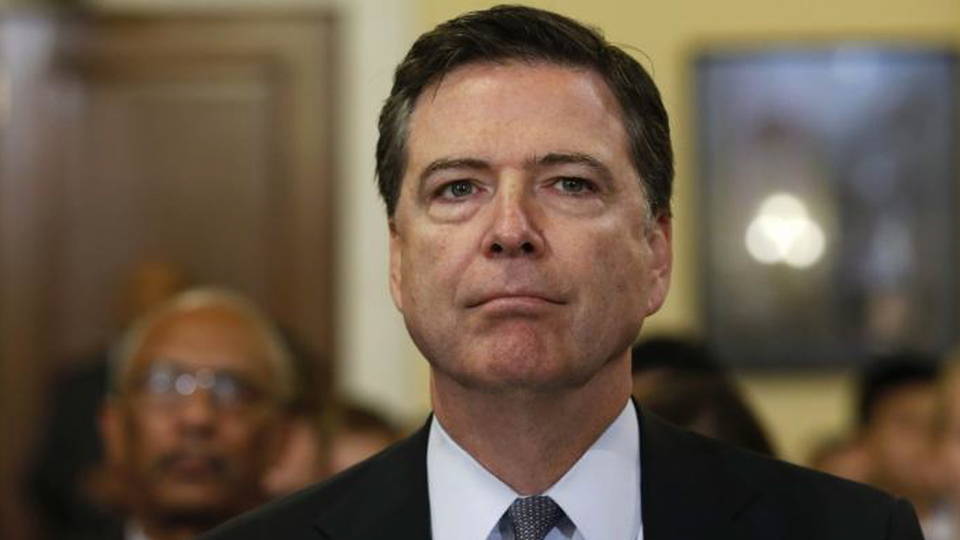
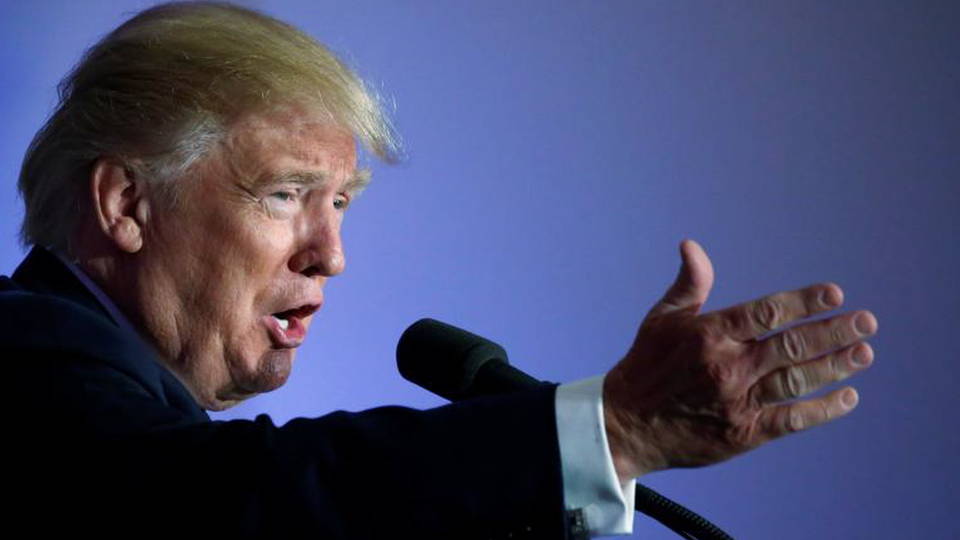

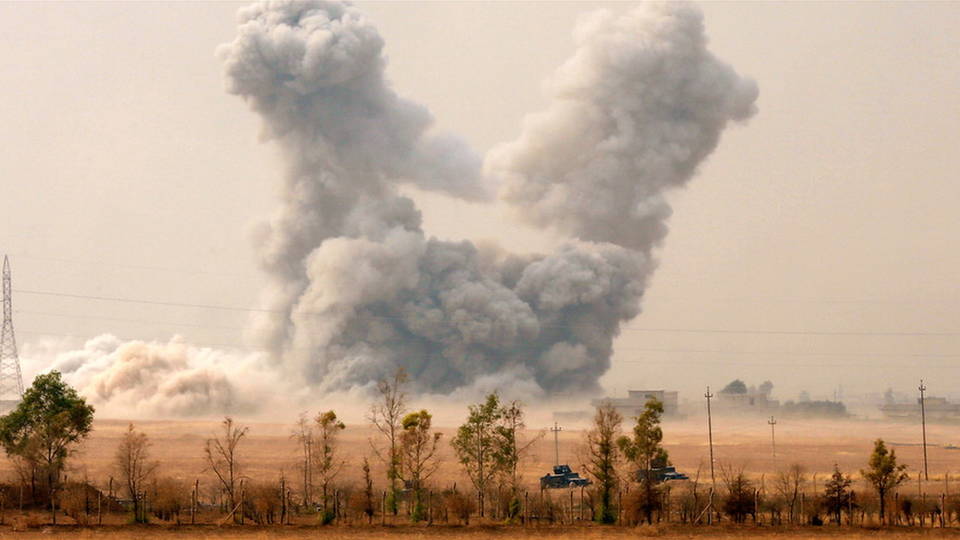
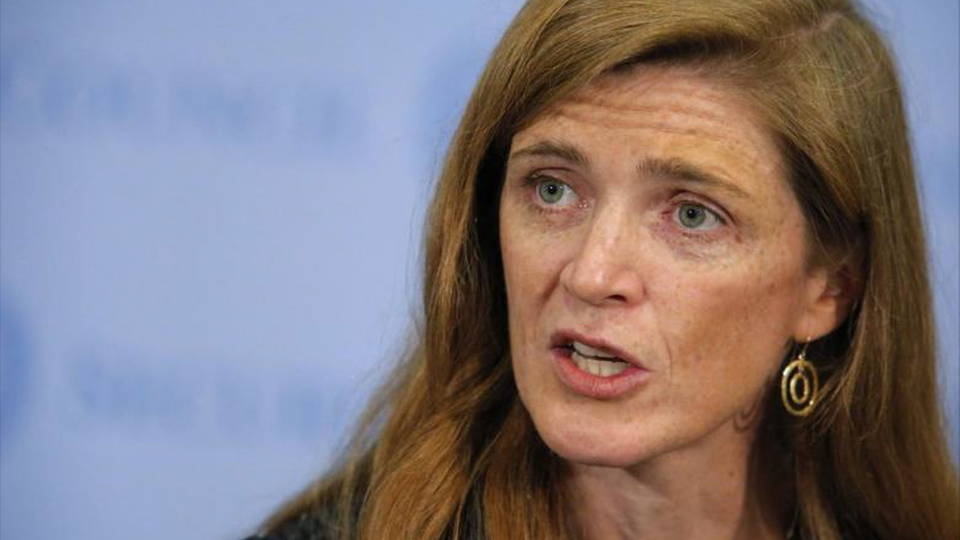
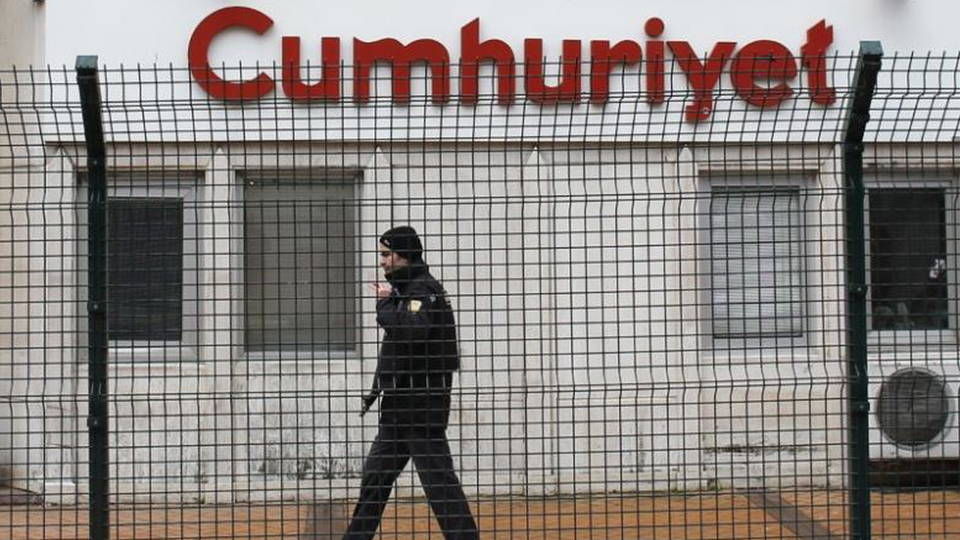
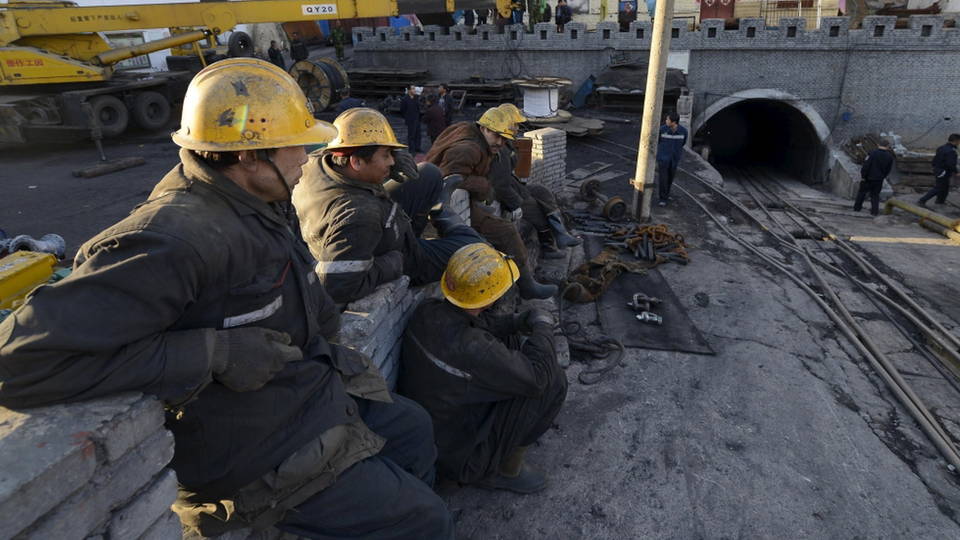

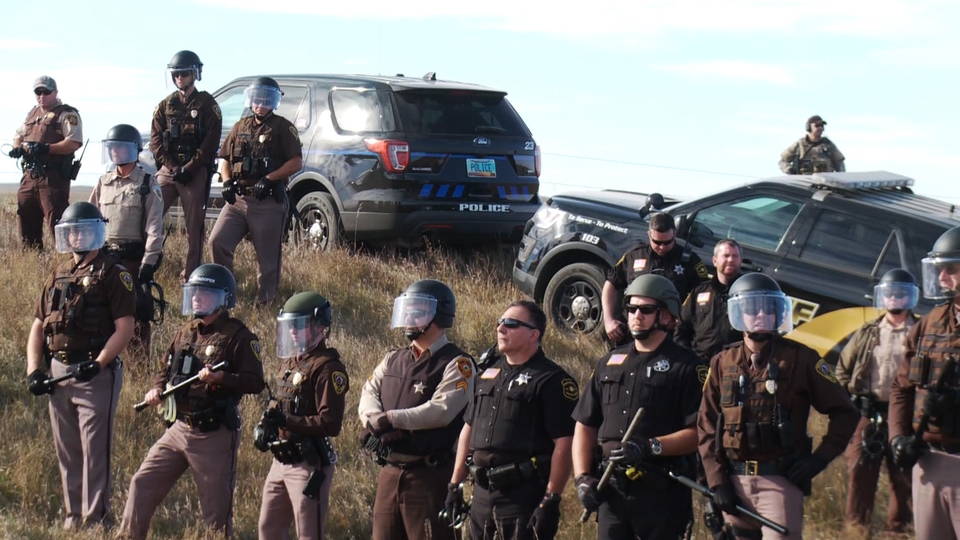
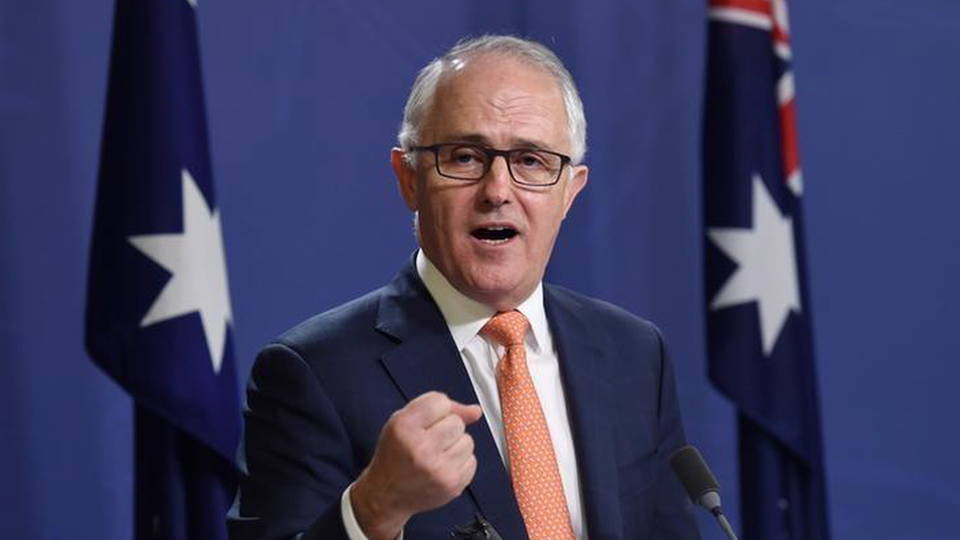
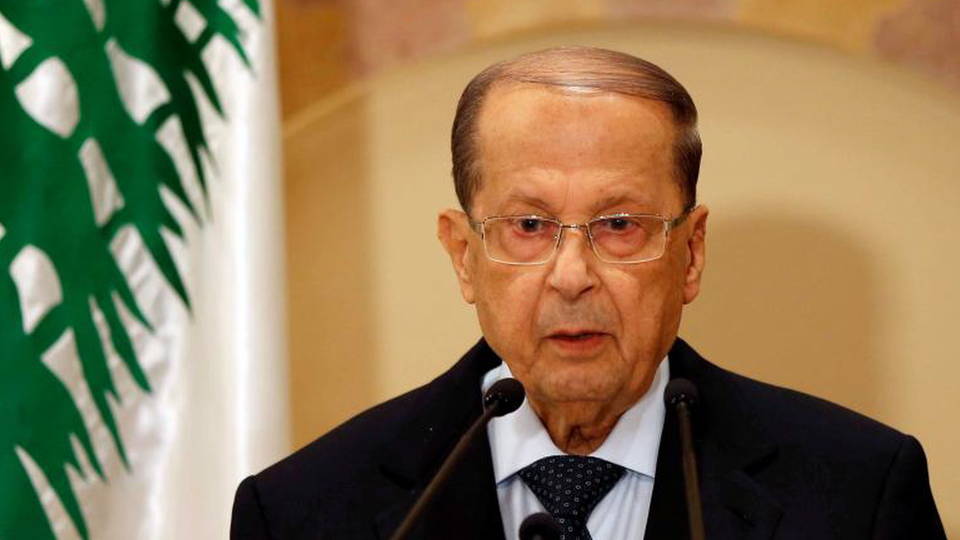
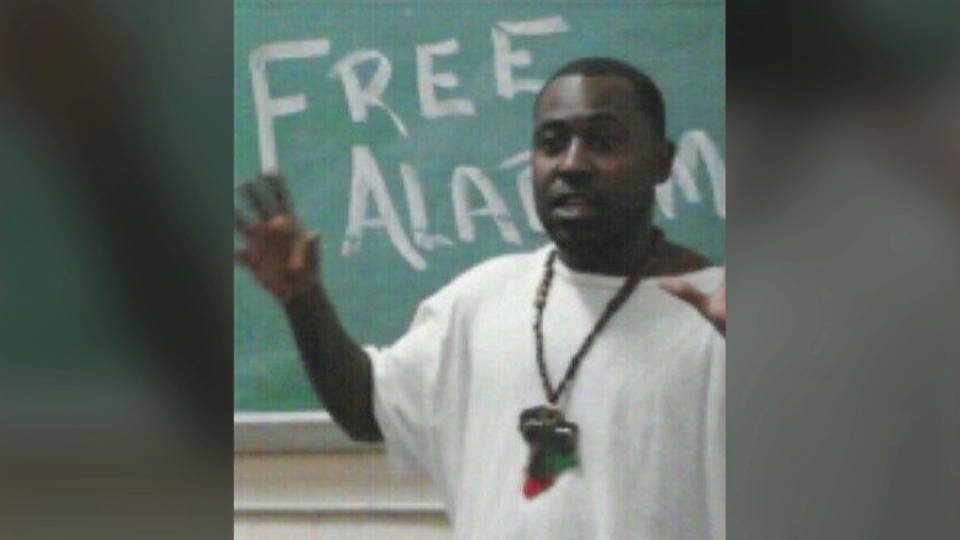
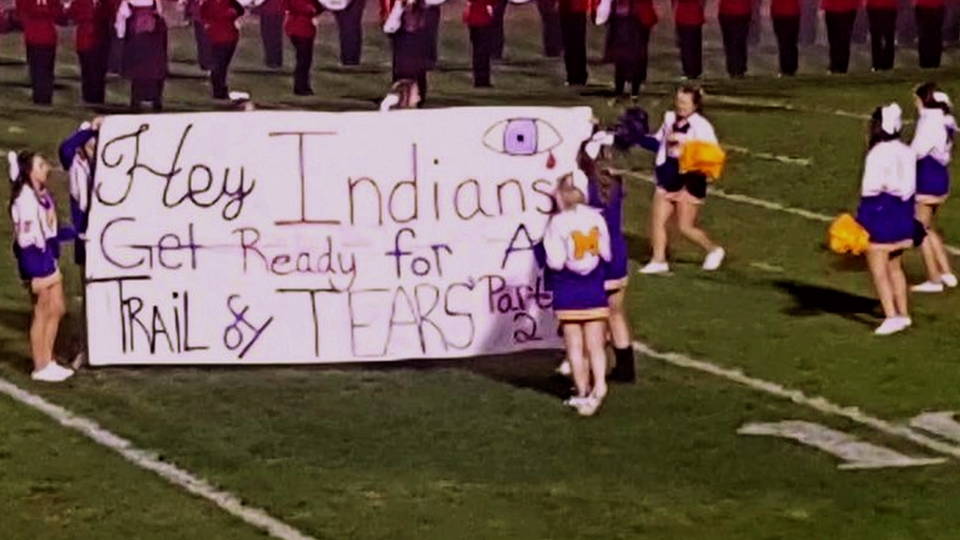 -------
-------
Donate today:
Follow:



WEB EXCLUSIVE

In election news, controversy continues to swirl over FBI Director James Comey’s announcement to congressional leaders that the agency is investigating more emails as part of its probe into Hillary Clinton’s use of a private email system. The emails were discovered as part of a probe into former Congressmember Anthony Weiner, the estranged husband of top Clinton aide Huma Abedin, who is under investigation after he sent illicit sext messages to an underage girl. On Monday, the FBI says it began to load the emails into a computer program for analysis, although it’s still not clear whether the investigation will be finished by Election Day—exactly one week away. The Clinton campaign is attacking FBIDirector James Comey, accusing him of a double standard after claims surfaced Monday that Comey argued earlier this month against naming Russia as meddling in the U.S. election and investigating a potential connection between Russia and the Trump campaign, because he thought it was too close to Election Day. Also on Monday, a spokesperson with the Office of Special Counsel indicated Comey himself may be under investigation for potentially violating the Hatch Act, which prohibits employees of the executive branch from engaging in political activity. Comey was first appointed to be deputy U.S. attorney general by President George W. Bush in 2003, then was appointed to be FBI director by President Obama. Click here to see Monday’s interview with Michael Isikoff of Yahoo News on the FBI’s "October surprise."
TOPICS:
NYT: Trump Avoided Paying Tens of Millions in Taxes Using Loophole Later Outlawed

A New York Times investigation based on newly obtained documents has revealed Donald Trump avoided paying tens of millions of dollars in federal income taxes in the late 1990s by using a tax maneuver that was later outlawed by Congress and was even at the time so legally questionable that his own lawyers cautioned him against using it. The maneuver included simply refusing to report hundreds of millions of dollars of canceled debt, which the IRS considers to be taxable income. Steven Rosenthal of the Tax Policy Center told the Times, "Whatever loophole existed was not ‘exploited’ here, but stretched beyond any recognition." Donald Trump has continued to refuse to release his tax returns.
TOPICS:
Senator Richard Burr Jokes About Putting Bullseye on Hillary Clinton

North Carolina Senator Richard Burr is under fire after audio surfaced of him joking about a picture of Hillary Clinton on the cover of a gun magazine and saying he was "shocked" it didn’t have a bullseye on it.
Sen. Richard Burr: "Nothing made me feel any better than I walked into a gunshop, I think, yesterday in Oxford, and there was a copy of Rifleman on the counter. It’s got a picture of Hillary Clinton on the front of it. I was a little bit shocked at that—didn’t have a bullseye on it."
Senator Burr supports Donald Trump. Trump has also been accused of inciting violence, after he suggested "the Second Amendment people" could assassinate Hillary Clinton while speaking at a campaign rally in August in North Carolina.
U.S. Airstrike Outside Mosul Kills 8 Civilians, Including 3 Children

The Guardian is reporting a U.S. airstrike in Iraq has killed eight civilians, including three children, after a family’s home outside Mosul was struck twice. The United States has confirmed it carried out airstrikes in that region on October 22, but it has not confirmed it killed civilians. This comes amid the U.S.-backed offensive aimed at retaking the city of Mosul from ISIS.
TOPICS:
Samantha Power Condemns U.S.-Backed, Saudi-Led Airstrikes in Yemen

U.S. Ambassador to the United Nations Samantha Power has spoken out against the U.S.-backed, Saudi-led coalition airstrikes in Yemen during a U.N. Security Council meeting, saying there is "absolutely no military solution to this conflict." This comes after at least 60 people were killed Saturday when Saudi-led coalition warplanes bombed a security complex near the Red Sea. Despite Power’s condemnation, the U.S. continues to supply Saudi Arabia with intelligence, airborne fuel tankers and advanced weaponry in the ongoing war in Yemen. This is the U.N. special envoy of the secretary-general for Yemen.
Ismail Ould Cheikh Ahmed: "We all need to ask: How long will Yemenis remain hostage to personal and reckless political decisions? What are the parties waiting for to sign a political agreement? Have they not understood that there are no winners in wars?"
TOPICS:
Turkey: Police Arrest Journalists of Award-Winning Cumhuriyet Newspaper

In Turkey, police raided the Istanbul office of the prominent Cumhuriyet newspaper, detaining at least 12 journalists and administrators on terrorism charges. The newspaper also reports its editor and one of its columnists were detained after their homes were raided by Turkish police. The Cumhuriyet newspaper won the 2016 Right Livelihood Award. This comes amid an ongoing crackdown in Turkey following the failed military coup in July. On Saturday, the Turkish government fired 10,000 civil servants and ordered 15 news outlets to shut down.
TOPICS:
China: 13 Miners Die After Explosion at Underground Coal Mine

In China, at least 13 miners have died after an explosion at an underground coal mine in southwest China Monday night. At least 20 more miners are currently missing. This is the deputy mayor of the Chongqing municipality, where the explosion occurred.
Mu Huaping: "Rescuers found some collapsed tunnels and poisonous and harmful gas in some areas exceeding standards. After verification, we have found 13 trapped people that have no signs of life, and are still searching for other trapped people."
Alabama: 1 Worker Dies, 5 Hospitalized After Colonial Pipeline Explodes

In Alabama, at least one worker has died and five have been hospitalized after a section of the Colonial pipeline exploded in Shelby Monday. This comes after the same pipeline leaked nearly 340,000 gallons of gasoline in Central Alabama in September, forcing the line to shut down for 12 days and leading six governors to declare states of emergency as gas prices rose throughout the region. The Colonial pipeline carries 1.3 million barrels of gasoline a day down to refineries in Texas and Louisiana, accounting for a full 40 percent of the region’s gasoline.
TOPICS:
ND Agency Requests $4 Million More to Police #NoDAPL Resistance

In more pipeline-related news, the North Dakota Department of Emergency Services is requesting an additional $4 million in order to continue the police crackdown against the resistance to the $3.8 billion Dakota Access pipeline. The Emergency Services Department has already received—and spent—$6 million to police the resistance movement led by the Standing Rock Sioux Tribe and members of 200 other nations and tribes from across the Americas. This comes as a United Nations advisory group is investigating possible human rights abuses by law enforcement against Native American water protectors in North Dakota.
TOPICS:
Australia PM Turnbull Proposes Lifetime Ban on Asylum Seekers Who Arrive by Boat

Australian Prime Minister Malcolm Turnbull has sparked outrage over his proposal to impose a lifetime ban on all asylum seekers who attempt to reach Australia by boat. Turnbull has vowed to introduce the legislation into Parliament next week.
TOPICS:
Lebanon Elects New President After 2.5 Years

In Lebanon, the Parliament has elected a new president: former army commander Michel Aoun. Lebanon has been without a president for two-and-a-half years. In his inaugural speech, Michel Aoun announced he’d send some of the 1.5 million Syrian refugees living in Lebanon back to war-torn Syria.
TOPICS:
Report: Officials Denying Prison Organizer Kinetik Justice Water

The Free Alabama Movement is reporting that incarcerated organizer Kinetik Justice is being denied water by prison officials at the Kilby Correctional Facility. Justice was transferred to Kilby from Holman Correctional Facility, where he helped launch a nationwide work strike. He’s been on hunger strike since October 21 to protest his transfer. He now says prison officials have turned off the water in his cell. Pastor Kenneth Glasgow, the outside spokesperson for the Free Alabama Movement, said, "They are trying to kill him." This is Kinetik Justice, speaking about the prison strike on Democracy Now! in September.
Kinetik Justice: "What a work strike looks like in prison is that, usually, around 12:30, 12:45 at night, they sent for the kitchen workers, those who will prepare the breakfast meal. And when those people don’t report to work, they initiate a prison lockdown to do an investigation to see what’s going on. ... So, throughout a work strike, leadership is really required, because you have to try to keep a balance inside these dormitories to keep violence from erupting, because one sign of violence inside these dormitories, the administration will use that as an excuse to bring in a CERT team and try to assert violence, or they’re trying to say that we’re having a riot or, you know, something outside of the character of what we’re actually doing on the work strike."
TOPICS:
Ohio: HS Cheerleaders Under Fire for Racist Banner Against Native Americans

And in sports news, tonight is Game 6 of the World Series in Cleveland between the Chicago Cubs and the Cleveland Indians. Native American groups are organizing to have Cleveland’s team drop its moniker, "Indians," and its mascot, "Chief Wahoo," which many consider a grotesque and racist caricature. This comes as, in Ohio, a high school cheerleading squad is under fire for unveiling a racist banner at a football game Friday night. The message by the Greenfield-McClain cheerleaders targeted rival Hillsboro High School, whose mascot is the "Indians." The banner read, "Hey Indians, Get Ready for a Trail of Tears Part 2." The Trail of Tears refers to the forced relocation of Native Americans beginning in the 1830s. Thousands died as entire tribes were forced from their homes and into Oklahoma.
TOPICS:
Donate today:
Follow:




WEB EXCLUSIVE

In Echo of Arab Spring, 1000s Protest in Morocco After Garbage Truck Fatally Crushes Fish Seller
NEW BOOK

Apply today to be a Democracy Now! intern
-------
207 West 25th Street, 11th Floor
New York, New York 10001, United States
-------
-------
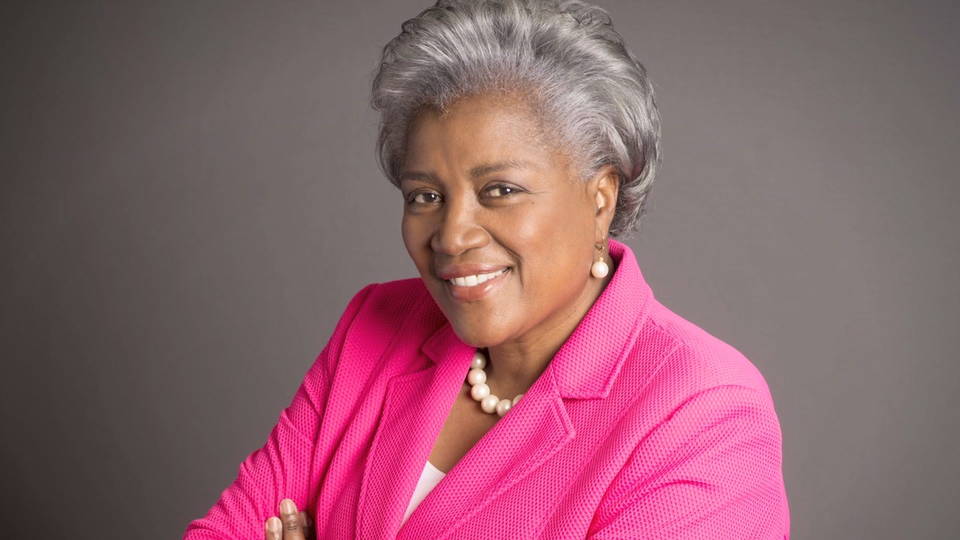

No comments:
Post a Comment